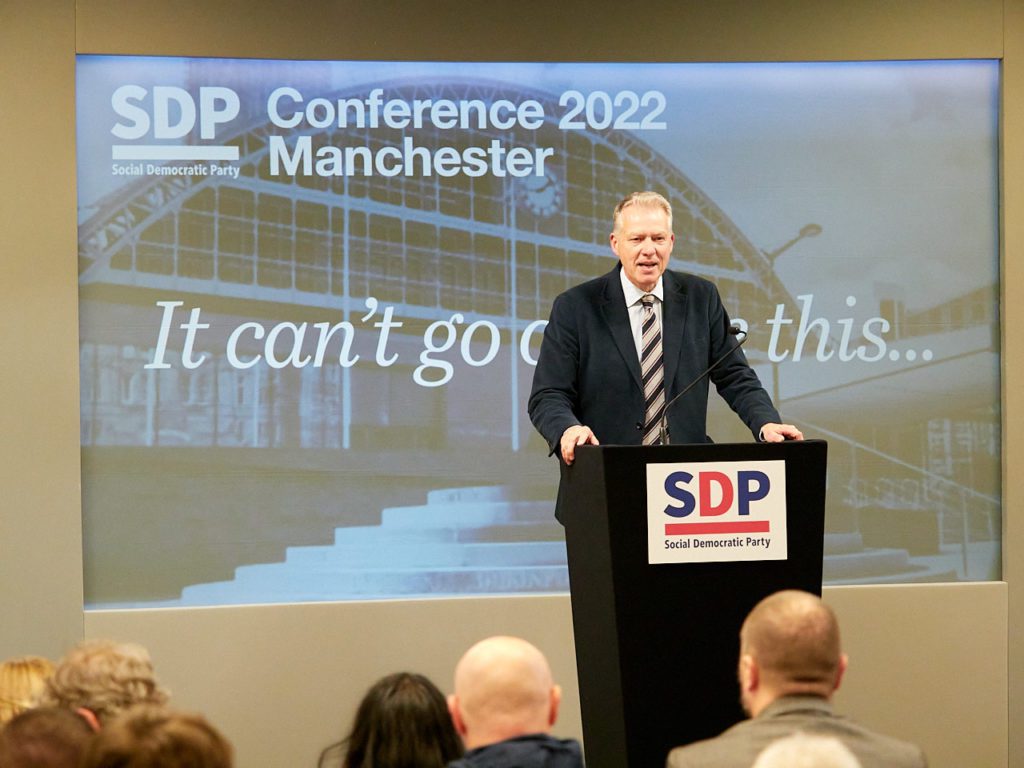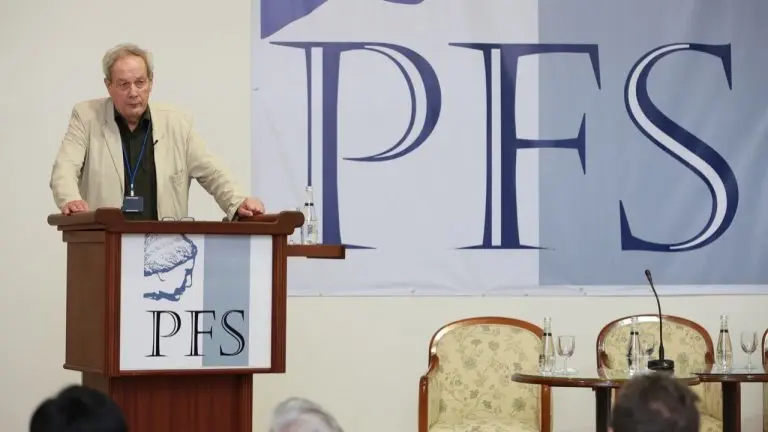I have previously raised the question of whether there can be such a thing as “Left-Wing conservatism.” The question garnered some positive responses and led to a fruitful discussion. It was therefore with great enthusiasm and curiosity that I accepted an invitation to attend the recent Social Democratic Party of the United Kingdom (SDP) party conference, held in Manchester earlier this month.
Although I have previously interviewed their party leader, William Clouston, I had not had the opportunity to engage with the broader party until I arrived in Manchester Central on Saturday, October 8th. Upon arrival, rolling in about an hour after the opening of the conference due to the ongoing railway strikes, I was met by a roomful of delegates. The conference held about 200 participants from across the country, and what struck me was the overwhelming normality of the attendees: men and women of all ages and professions, whether young couples, aged farmers, or city brokers.
The normality of the attendees can perhaps be described by the self-defined “common sense” approach of the party, coupled with broad policies rather than a one-trick-pony approach often associated with marginal parties. The SDP sits on a recipe that could truly make them a popular party, without falling for the trap of becoming merely populist. The assembled delegates were also gathered not for political aspiration—because the outlook for political career progression is still rather limited—but for passion for policy. In a one-day conference, there is only so much that can be discussed, with the consequence that policy debates were limited. Yet, during the breaks I heard people sharing ideas as to how to make the country better, without resorting to platitudes and pre-established talking points.
The SDP is a party with a history, stemming from the break with Labour in the 1980s, later merging with the Liberals, and once again resurfacing in the past decade. It holds a mix sometimes described as “economically centre-left, and socially conservative”—meaning Right-Wing. Some attendees of the conference disagreed with this categorisation. “What is Right-Wing about saying a woman is a woman?” asked one speaker. Herein lies the counter-cultural aspect of the party: they don’t shy away from challenging the prevailing ‘Woke’ agenda. Or perhaps it isn’t counter-cultural, but rather a willingness to call a spade a spade and shine a light on the Wokeness of our time, which upon inspection is shown to be a rather empty corner. Wokeness has established a brand, and it is a loud one, but it isn’t particularly big. When Rod Liddle, one of the conference speakers, was asked what he thought would happen if a party such as the SDP was challenged on this socially conservative stance, he simply—and in the brash way that only he can convey—stated: “there are only about 1.8 million active users of Twitter, and they are the loud ones. This is hardly a majority movement!”
Britain has become accustomed to the two-party system. Sure, there exist other parties as well, but when it comes down to who is meant to govern, it is always one of the same two parties. The SDP stand where the broad majority of voters actually are. Most people don’t believe in unfettered and unregulated capitalism, but they are not hankering for state socialism either. The majority of voters are not Woke, nor do they have any problem defining the term ‘woman.’ The SDP seemingly provides a dose of common sense in our uncommonly confused age. The problem they have is one of branding. “You mean the SNP? Or the LDP?” Nobody, or nearly, nobody, has heard of the SDP. Why is this? John Cleese has a suggestion.
Speaking as the conference’s keynote speaker, John Cleese, the legendary comedian and actor, pointed a rather determined finger at the media. The media is in the pockets of the Right, he said, and recent governments (Cameron’s government excepted, as Cleese expressed admiration for the ex-ex-ex Prime minister), serve only to pat each other’s backs granting peerages to party peers. It strikes me as a slight over-exaggeration on his part, but what is humour without a slight overstatement? He did refer to the distrust British citizens have of their media, lower than in any other European country. The days following the conference have shown, however, that the SDP can be seen in the media. Cleese’s appearance was mentioned on national radio and TV, and one of the conference speakers wrote about the conference in The Times, while Rod Liddle dedicated his Spectator column to the conference.
Several speakers expressed the same idea: “I am not a member, but I sympathise.” This seems to be a common trend. People agree with much of what the party stands for, such as controlled immigration, limited but targeted financial regulation, putting the family first, building housing, and challenging Wokeness. Yet, people don’t want to join an unknown group, as doing so risks coming across as an oddity. It sounds like one is left of Labour, and speaking out against Wokeness can seem like charging towards Sancho Panchaz’s famed windmill.
There is a grain of truth to this: the Woke agenda is sometimes exaggerated, but it is nevertheless real. People do get sacked for not conforming to he/she/ze/it/etc. pronoun dictates imposed by many corporate entities, and one person sacked for that is one too many. In time, the SDP will likely become a household name, and any confusion about where the party stands will dissipate. As long as the SDP remains sensible in their criticism without letting it become its sole raison d’être, they are on a path to becoming a potential contender for the leadership of the United Kingdom.





